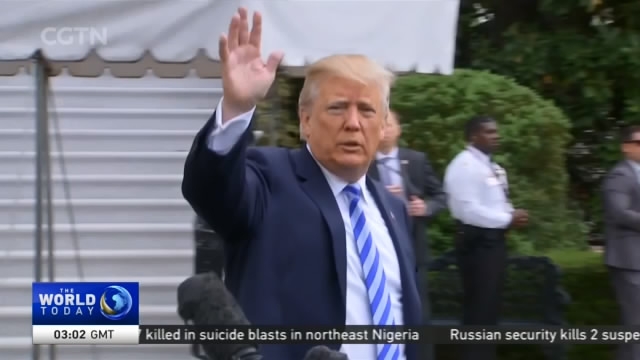
11:32, 05-May-2018
US-China Trade Talks: Details on outcome of meetings remain murky
02:43

China and the US have reached agreements on some of their trade issues. The two sides met for talks in Beijing on Thursday and Friday. However, big differences remain, and any specific results of the talks have not been disclosed. CGTN's Nathan King explains.
What agreements were reached we do not know, but both Chinese and U.S. officials have agreed to keep talking. According to a statement from Chinese news agency Xinhua:
"Both sides recognized that given that considerable differences still exist on some issues, continued hard work is required for more progress."
As the U.S. team heads back to Washington, U.S. President Trump sounded optimistic.
DONALD TRUMP US PRESIDENT "I have great respect for President Xi. That's why we're being so nice. And we have a great relationship. But we have to bring fairness into trade between the U.S. and China and we will do it."
The White House issued a statement, saying the talks were constructive-though the two sides remained far apart.
"The United States delegation affirmed that fair trade will lead to faster growth for the Chinese, United States, and world economies."
But the U.S. negotiating documents - shared widely with the U.S. and British media - reveal demands over and above what the Trump has publicly asked for, including:
A 200-billion dollar reduction in the China-U.S. trade deficit by 2020. Halting subsidies for key industries under 'Made in China 2025' plan. Ending technology transfer requirements for U.S. companies doing business in China. Strengthening Intellectual Property protections. Drop WTO complaints or impose retaliatory tariffs on U.S. goods.
Will the U.S. hold off imposing tariffs on 150 billion dollars' worth of Chinese imports while the talks continue? A big question for global stock markets-and tens of thousands of businesses potentially affected by the trade dispute.
If the White House proceeds, China has vowed to slap tariffs on imports of U.S. aircraft, vehicles and soybeans or just stop buying them. Then there are the U.S. plans to limit Chinese investment in U.S. technology and communications. Will the plans go forward Or will they be put on hold?
NATHAN KING WHITE HOUSE During the talks, Chinese negotiators brought up the recent case of cellphone company ZTE. The U.S. Commerce Department banned ZTE from buying American-made parts for seven years-a ruling that could destroy the company. U.S. negotiators said they would report China's stance to Donald Trump. Cases like ZTE and others are seen as tests of whether Washington is willing to make concessions as well as demands. Nathan King, CGTN, White House.

SITEMAP
Copyright © 2018 CGTN. Beijing ICP prepared NO.16065310-3
Copyright © 2018 CGTN. Beijing ICP prepared NO.16065310-3